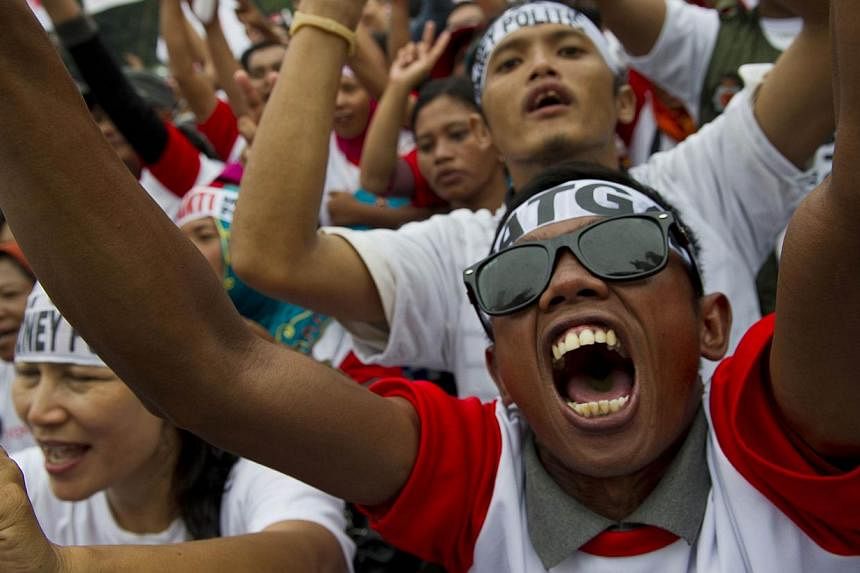When Indonesians go to the polls tomorrow they will be conscious of participating in the country's closest presidential race, a genuine two-horse cliffhanger that could trigger repercussions if the margin of victory is razor-thin.
Most June polls show Indonesian Democratic Party - Struggle (PDI-P) candidate Joko Widodo leading by 2-3 per cent over his Great Indonesia Movement (Gerindra) rival Prabowo Subianto, with much riding on wavering voters and election-turnout demographics.
How accurate are the surveys? In 2009, incumbent Susilo Bambang Yudhoyono beat PDI-P leader Megawati Sukarnoputri by a landslide 60 per cent to 26 per cent.
That compared to Lembaga Survei Indonesia's (LSI) pre-election poll of 63 per cent to 20 per cent. But with a third candidate, vice-president Jusuf Kalla, securing 12 per cent of the vote, 5 percentage points fewer than predicted, the comparison is virtually meaningless - more so now because of Mr Prabowo's surprising late charge into Ramadan.
The winner will most likely be known by the breaking of the fast tomorrow evening. Back in 2009, the quick-count results were remarkably accurate, in LSI's case down to the last decimal point.
With 11.3 per cent undecided, Indo Barometer's June 16-22 poll has Mr Joko ahead by 46 per cent to 42.6 per cent. But it says if Mr Joko has been unable to arrest Mr Prabowo's late surge, the retired general could win by 53 to 47 per cent.
Three weeks is an awful long time in politics, particularly in an election as fluid as this one. If the margin of victory is any closer than that for either side, it could spell trouble, either in the courts or on the street.
There has never been a time when Indonesian voters have been so emotionally wedded to one presidential candidate or the other.
That's not a bad thing. In fact, the turnout should top 2009's poor 68 per cent when Dr Yudhoyono was a shoo-in.
But in a broad sense, Indonesia is getting a small taste of what Thailand has been through with Thaksin Shinawatra, whose 2001 success team helped shape Mr Prabowo's social policies during the early years of his political resurrection.
Divided loyalties have split families and friends, with the Indo Barometer poll painting a picture of the wealthy, women and the poor largely siding with Mr Joko, and the middle class, including teachers and union workers, gravitating around Mr Prabowo.
As was clear on a recent road trip around Central and East Java, more than half of survey respondents associated Mr Prabowo with his military background and promise of firm leadership and paid scant attention to his human rights record.
Mr Joko, for his part, is mostly associated with his previous position as Jakarta governor, which gained him nationwide stature in the brief 18 months he was in office. But he is also recognised for being close to the people and for being simple and honest.
Ask around and it all comes down to these stark differences between two men who are already separated by nine years in age, multiple layers in social status and life experience - and a whopping US$147.7 million (S$184 million) in personal wealth.
"For me, it's quite simple," a close Indonesian friend tells me. "I look at Joko and it's a case of 'what you see is what you get'. There's no baggage about him. A simple man who I feel I can trust. With Prabowo, I see him and I see so many ghosts."
Regionally, the latest Indo Barometer survey shows Mr Joko and running mate Jusuf Kalla holding a 5 percentage-point edge on Java, home to 98 million of the country's 188 million eligible voters, and trailing narrowly off it, with all six other main island groups taken into account.
There, they hold healthy leads in Sulawesi (30 percentage points) and Papua (10 percentage points), while Mr Prabowo and sidekick Hatta Rajasa are in front on Sumatra (9 percentage points) and Kalimantan (3 percentage points) and by wider margins on thinly populated Maluku (10 percentage points) and Nusa Tenggara (52 percentage points).
In a practical move, the Constitutional Court has already ruled out the possibility of a second round, declaring that in a two- way race, the winner does not also have to capture 20 per cent of the vote across half of Indonesia's 34 provinces.
Legislators included that extra provision in the 2008 Presidential Election Law in anticipation of more than two candidates, which was the case for both previous direct presidential elections.
While there are few worries about the conduct of the election itself, Chief Justice Hamdan Zoelva, a former Moon and Crescent Party lawmaker, has warned of the likelihood of violations during vote-counting or in the recapitulation process at the village, ward and sub-district level. In such an atmosphere, irregularities don't have to be systematic. Even a problem at a single polling station can be turned into something endemic. The court of public opinion doesn't need the same level of proof as a court of law.
And what of the judicial system? Certainly the Constitutional Court, whose decisions on electoral issues are inviolate, has been put on notice after the court's former chief justice, Akil Mochtar, was recently sentenced to life imprisonment for election bribery.
It was the heaviest penalty ever handed down to a public official, in large part because his actions were seen to have discredited the country's highest court and undermined the democratic process.
At 52, Mr Zoelva is the youngest of the three justices to occupy the position. He must be aware that the spotlight is squarely on him. That isn't a bad thing either as the race goes down to the wire.

